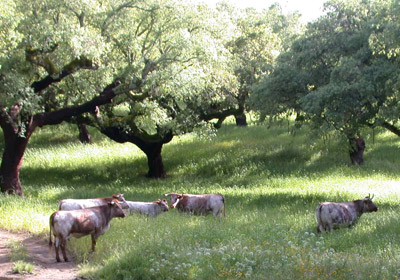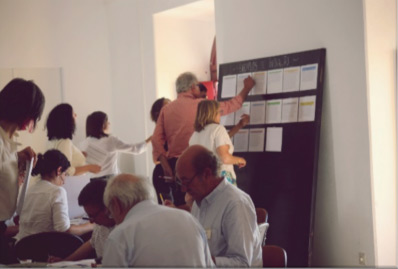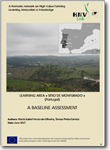Sítio de Monfurado, Portugal

Sítio de Monfurado, Portugal
Sítio de Monfurado, Portugal, is part of the Natura 2000 network, and includes complex montado systems of oak trees, diverse shrubs and grasslands, sometimes intermixed with agricultural crops and grazed by domestic and wild herbivores.
Farming aims at cork harvesting and low intensity livestock production. The area has considerable heritage values and has hosted LIFE projects.
The municipalities put considerable efforts into increasing farmers’ awareness of nature values, related recreation values and public goods. It is an example of close engagement of farmers in the Nature 2000 site planning process. Most recently, an innovative approach targeted urban dwellers.
For more information on the HNV farming systems, challenges and innovations, see the innovations page of Sítio de Monfurado.
More info: www.evora.net/percursos/monfurado.htm
Contact person:
Participatory approach
From the very beginning, the team for the HNV-Link project in the Portuguese Learning Area (LA) of Sítio de Monfurado has adopted a participatory approach in implementing the project. The team is based in the University of Évora, and it has a long history with various actors from the LA, including: farmers, local public administration, producer associations and local action groups. These relationships result mainly from previous research projects and from involvement in local activities.

For the team, the participatory approach means an active involvement of different stakeholders in the processes of gathering information, discussing, sharing and disseminating knowledge and practices regarding the HNV agro-silvo-pastoral system of Montado. The team used several ways of engaging local actors through the project implementation: interviews, formal and informal bilateral meetings with public administration, farmers and farmer representatives, focus groups, and workshops. With prior expertise and experience in multi-actor processes, the team made sure that concerns, aspirations and perspectives of the actors was given a prominent role in all these events.
The team of Sítio de Monfurado has greatly benefited from the initiative called Tertúlia do Montado. It was initiated by ICAAM/University of Évora in April 2016 with an objective of establishing a regular and structured dialogue between researchers, land owners, land managers, public administration and the private sector towards the sustainable development of the agro-silvo-pastoral Montado system. So far, the group has held fourteen sessions. The project team integrated its activities into the programme and process of this initiative.
WHO IS INVOLVED?

Already from the project application stage, the HNV-Link team consulted the key stakeholders in the Sítio de Monfurado (such as the regional direction of Agriculture, DRAPAL; the municipality of Montemor-o-Novo and the Regional Coordination Commision, CCDRA) on the design of the HNV-Link project. As the project evolved, other relevant actors became involved in discussions and participation in the project’s many activities. New actors include: many local farmers, land managers, and land owners of montado farmlands; local development groups and associations (LAGS); the Institute for nature conservation and forests (ICNF); the Cabinet for planning and policy making (GPP) of the Ministry of Agriculture; and the National Rural Network.
ACTIVITIES
The main participatory activities in the LA Sítio de Monfurado under HNV-Link focused on the co-creation and validation of the HNV Vision for the Sítio de Monfurado, followed by an HNV innovation assessment. This process enabled the identification of the main challenges experienced by different stakeholders on the road to attaining the jointly agreed vision and, therefore, also aided in identifying the main innovation gaps in the area. The formal involvement with other HNV-Link LAs for exchanges of innovative approaches to address the LA innovation gaps was initiated at the Innovation Fair in October 2017 in Montemor-o-Novo. The process continues with several cross visits by the team and the key actors.
Table 1: List of participatory events in LA Sítio de Monfurado, Portugal (up to April 2018)
| Activities | Number of participants | Date |
|---|---|---|
| Interviews with key stakeholders | 15 | Jan-Mar 2017 |
| Sítio de Monfurado Innovation Seminar | 25 | June 2017 |
| Bilateral meetings with Cabinet for planning and policy making (GPP) | 5 | Sept 2017 |
| Tertúlia do Montado – Agro-environmental measures for the Agro-silvo-pastoral Montado (with the participation of HNV-Link) | 27 | Sept 2017 |
| Inovation Fair (included in the 2nd network meeting of HNV-Link) | 45 | Oct 2017 |
| Bilateral meetings with Cabinet for planning and policy making (GPP) | 4 | Nov 2017 |
| Tertúlia do Montado - Agro-environmental measures for the Agro-silvo-pastoral Montado II (with the collaboration of HNV-Link) | 30 | Nov 2017 |
| Tertulia do Montado - Montados’ health: problems and management practices (part I) | 29 | Nov 2017 |
| Tertulia do Montado - Montados’ health: problems and management practices (part II) | 25 | February 2018 |
| Tertulia do Montado - Climate change scenarios and management practices adaptation in Montados | 30 | March 2018 |
| Training week – Territorial Game (Divercrop project, with the collaboration of HNV-Link) | 25 | April 2018 |
| Participation on the “Territorios Pastoreados” and cross visit of the LA La Vera (Spain) | 5 participants from SM LA | April 2018 |
Video
Video describing the overall process of the baseline assessment and feedbacks from local actors: farmer, local agricultural administration, University of Evora
Disclaimer: This document reflects the author's view and the Research Executive Agency is not responsible for any use that may be made of the information it contains.
Outputs
-
 Sítio de Monfurado, Portugal LA
Sítio de Monfurado, Portugal LA
- Baseline Assessment
- National Language Report Innovation seminar
- Innovation report
- Participatory approach, Sítio de Monfurado, Portugal
- Sítio de Monfurado, Portugal, HNV-Link Final Conference (Poster)
- Action Plan
(April, 2019)The compilations of the respective reports from all project learning areas - Baseline Assessments, Reports from innovation seminars, and Compendium of Innovation - can be found in 'Outputs'. Reports from the Innovation seminars are in the national languages, all other materials are in English.
